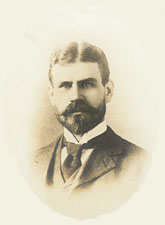Juan A. del Regato Collection of Jesse W. Lazear Materials

Jesse Lazear
by unidentified photographer
Collection Overview
Creator: Lazear, Jesse William (1866 - 1900)
del Regato, Juan A. (1909 - 1999)
Collection Date: 1882 - 1992
Extent: 2 linear feet
Biography
Biography of Jesse Lazear
Jesse W. Lazear was born in Baltimore County, Maryland, and graduated from the Johns Hopkins University with an A.B. in 1889. He received his M.D. from Columbia University in 1892. After study in Europe, he returned to the Johns Hopkins Hospital as the assistant resident physician from 1895 to 1896. Lazear served as a member of the Johns Hopkins medical faculty as assistant in clinical microscopy from 1897 to 1900, and made valuable contributions as a teacher and investigator. In February 1900, he became an acting assistant surgeon in the United States Army assigned to Havana, Cuba, to investigate the causes of malarial and yellow fevers. To test the theory that mosquitoes were instrumental in the transmission of yellow fever, Lazear subjected himself to the bite of a mosquito. Two weeks later, he died of the disease on September 25, 1900, in Quemados, Cuba. A group of his Johns Hopkins colleagues, including William Osler, William Thayer, and Stewart Paton, initiated a subscription for a memorial tablet. On October 5, 1904, an inscribed bronze tablet was presented by United States Medical Corps Assistant Surgeon James Carroll, an associate of Lazear on the U.S. Army board in Cuba. The memorial tablet is located in the main corridor of Johns Hopkins Hospital. Jesse W. Lazear was awarded the Congressional Medal of Honor posthumously in 1929.
Scope and Content
The Juan A. del Regato Collection of Jesse W. Lazear Materials contains items compiled by del Regato towards his interest in writing a biography of Jesse Lazear. While a monograph was never realized the collection did provide source material for several articles he authored on the subject of Lazear and the Yellow Fever Commission. The biographical documents he gathered relating to Lazear are primarily photocopied items collected over the course of several years of research. Some documents were provided by members of the Lazear family, some by government agencies, and some by private repositories. Much of the core collection of documents, are from the Philip S. Hench Walter Reed Yellow Fever Collection at the University of Virginia, bearing that library’s stamp. The collection includes copies of Lazear’s academic records and degrees, army records, photographs, some research data on mosquito inoculation (1882-1900), as well as journal articles, tributes, memorials and other dedications to Lazear written after his death (1900-1970).
Additional Links
U.S. Army Yellow Fever Commission Exhibit at University of Virginia
